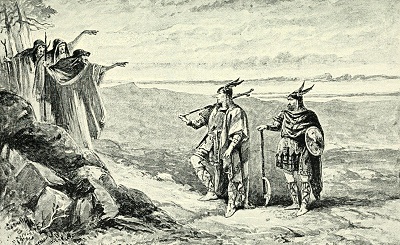| directory |
| home | contact |
|
|||||||||||||||
| search | |||||||||||||||
MacbethPlease see the bottom of the page and the highlighted text for full explanatory notes and paraphrases.
Next: Macbeth, Act 1, Scene 4 _______ Explanatory notes below for Act 1, Scene 3 From Macbeth. Ed. Thomas Marc Parrott. New York: American Book Co. (Line numbers have been altered.) __________ With this scene the real action of the play begins. The first scene brought the witches before us; the second gave us a noble picture of Macbeth. Now the two parties, the tempters and the tempted, meet, and from their meeting and the witches' prophecy proceed directly all the remaining events of the story. The witches awaken in Macbeth the passion of ambition, which henceforth is the mainspring of his action. But we must not think that they in any way enchant Macbeth or compel him to do their evil will. After the meeting, as before, he is a free man, and can act or refrain from action as he sees fit. This is shown, in part at least, by the fact that Banquo, although also greeted by the witches with prophecies of future honour for his house, is not led on to any crime to make good the prophecy. There is something in Macbeth's own heart that receives and answers the greeting of the witches. This is Shakespeare's way of writing tragedy ; he makes the fate of his men and women depend upon their own characters, not upon chance or outside influences. In the first thirty-seven lines of the scene, the witches recount to each other the evil deeds in which they have been engaged since their last meeting. It is worth noting that these deeds are petty and vulgar; but just as every good deed — even the giving of a cup of cold water, — is a blessed thing, so every evil deed — even the killing of swine — is a delight to the powers of evil. This conversation, moreover, serves to identify the "weird sisters" of the play with the familiar witches of Elizabethan superstition. 2. Killing swine. One of the commonest charges brought against supposed witches in Shakespeare's day was that they maliciously killed by pestilence, or the evil eye, the domestic animals of those they had a grudge against. 45, 46. By each ... lips. The witches lay their fingers on their lips to hush Banquo into silence. Their business is not with him, but with Macbeth; and they will not speak to Banquo until they have discharged their errand. 47. beards. Witches were generally thought of as bearded women. 49. All hail, Macbeth. The witches, like ghosts, will not speak until they are spoken to; but as soon as Macbeth questions them, they break out in their triple hail. 50. Glamis. an old castle in Scotland, still standing. The title "Thane of Glamis" was hereditary in Macbeth's family. See line [73] of this scene. 53. start. Macbeth starts because the witches' prophecy that he shall be king is an echo of his secret ambition. Indeed it would seem from his wife's words (i. 7. 48-52) that he had on some previous occasion gone so far as to plot the murder of Duncan. 57. present grace, "honour," "honourable distinction," referring to the title of Thane of Glamis, which Macbeth then enjoyed. 58. royal hope, the hope, or expectation, of royalty. 59. rapt, Macbeth is so struck with the greeting of the witches that he stands silent as in a trance, while Banquo speaks. 67-9. Lesser ... none. The ambiguity of the witches' address to Banquo is in marked contrast to the directness of their speeches to Macbeth. He is to be "lesser than Macbeth" in rank, and "greater," because he will never be the slave of guilt; not so "happy," i.e, "fortunate," because he will never be king, "happier" because he will never fall from his estate. The prediction that he shall "get," i.e, "beget," kings, is also vague, since it only asserts that some of his descendants shall be kings. According to tradition, the royal house of Stuart sprang from Banquo's son, Fleance. [Please click here for much more on this subject.] 81. Note the different way in which the sudden vanishing of the witches affects Banquo and Macbeth. The former is only surprised; the latter regrets that they did not remain to tell him more. 88, 89. Your children, etc, Macbeth cannot free his mind from the predictions of the witches, but he carefully avoids mentioning the most startling of them. 112. devil in this line is pronounced as a monosyllable like the Scotch "deil." 113, 114. dress me In borrowed robes, adorn me with honours that are not mine. 115. Who was the thane, he who formerly was the thane. Cawdor had already been deprived of his rank and possessions. 116. under heavy judgement, under sentence of death. 128. trusted home, completely trusted. 134. In deepest consequence, in matters of the greatest importance. 137. the swelling act, the performance developing in my mind. 140. I am in this line should be contracted in reading into "I'm" to preserve the meter. 142. unfix my hair, make my hair stand up in fright. 144. Against the use of nature, unnaturally. ________ How to cite the explanatory notes:________ More Resources |

More to Explore
|
©1999-2021 Shakespeare Online. All Rights Reserved.